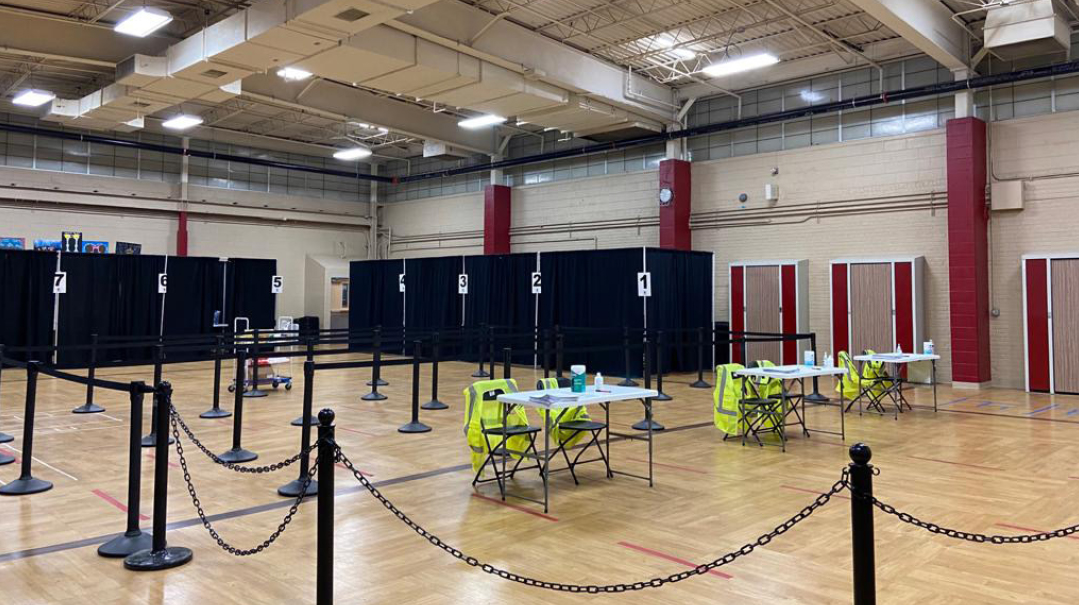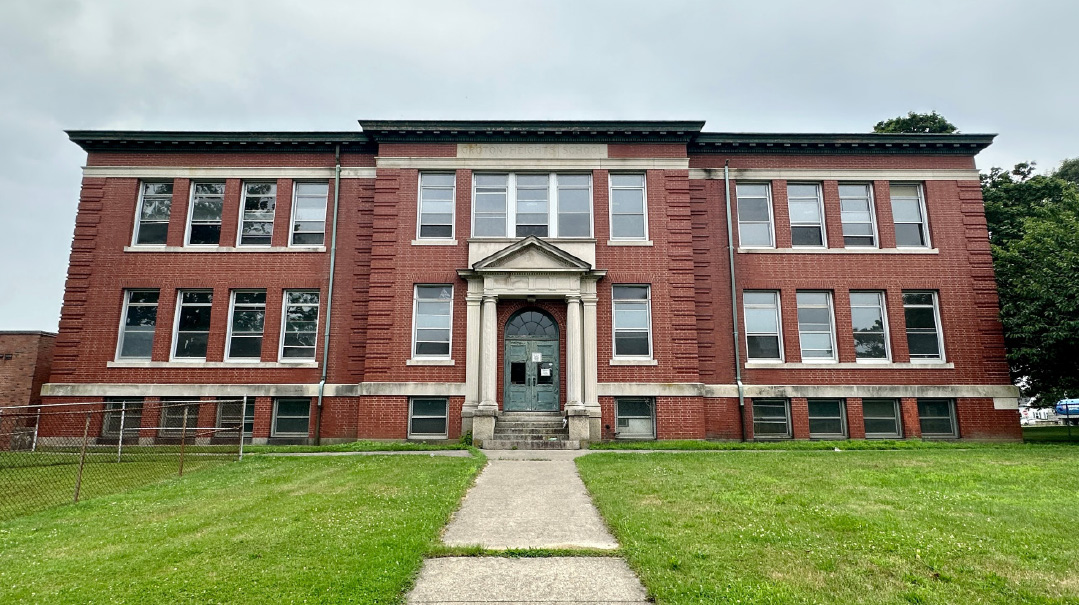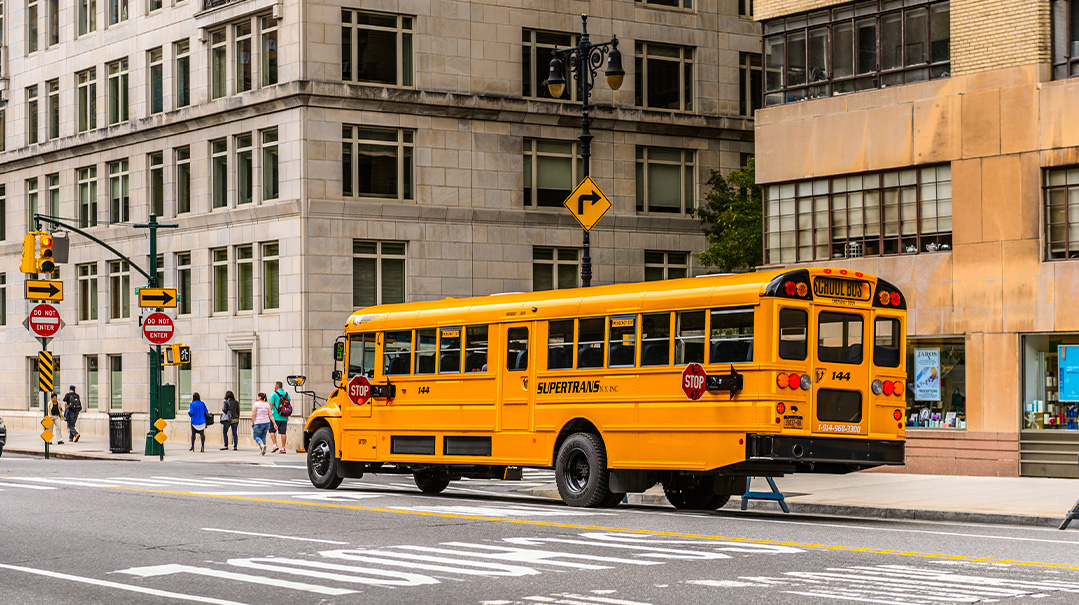City of Big Shoulders Gets a Shot in the Arm

One yeshivah speeds ahead in Chicago's vaccine drive

The catchphrases “flatten the curve” and “shelter in place” that buzzed throughout the Covid pandemic are giving way to “getting jabbed” and “shot in the arm.” And in Chicago, the Jewish community has taken the lead in getting the precious doses administered. Its program, the Community Vaccine Alliance, has become a model for the nation.
Rabbi Shlomo Soroka, the director of government affairs for Agudath Israel of Illinois, told Mishpacha that the “overwhelming majority” of the Windy City’s elderly and teachers received their shot of life at a makeshift clinic hurriedly set up at the gym of a local yeshivah.
The clinic, Rabbi Soroka said, was the first such concept in the nation — a health center set up specifically for the purpose of delivering vaccines. It relies on an all-volunteer base of 600 people and counting, and builds on a local yeshivah’s successful efforts years ago to become accredited as a medical clinic. Already, the Central Hatzolah based in New York has inquired about replicating the program, and other Agudah groups are contemplating setting up the model in their cities.
“It’s the only one of its kind in the country, to my knowledge, a community organization that became more than just a one-day clinic,” Rabbi Soroka said. “There’s a number of advantages to being a community-based organization, such as getting the word out and making it easy in a culturally sensitive way.”
When the White House reached out to Agudah’s DC director, Rabbi Abba Cohen, about vaccination efforts in the Orthodox community, he pointed to Chicago as the gold standard.
“How can we tap into this so replicate your model?” an administration official asked Rabbi Soroka. “We don’t have the capacity to do this, to mobilize so many people, galvanize so many volunteers.”
The Community Vaccine Alliance received a big boost two weeks ago when Mayor Lori Lightfoot paid a visit, during which she turned to her vaccination czar, Tamara Mahal, and asked her to ensure the group gets sufficient doses and resources. That visit put the alliance on the proverbial map, Rabbi Soroka said, and quieted growing hesitance from city officials over their medicinal experiment.
“Some officials were saying, ‘Okay, you did your job, you took care of the teachers, you took care of the elderly — maybe now is the time to start winding down,’ ” Rabbi Soroka recalled. “But the mayor then came and was so impressed, and other city officials were so floored by the selflessness of the Jewish community. We are absolutely planning on going further.”
Taking Shape
The seeds of the clinic began in February, just as the vaccination program was getting underway, when teachers in Chicago’s yeshivos needed the vaccine. Doses were scarce, and the public schools were still shut for in-person learning, so teachers were not high on the priority list. It was clear, however, that the hundreds of Holocaust survivors who make Chicago home must be prioritized for the vaccine before the teachers.
Before that could happen, the alliance had to first get accredited by the federal and city governments. Becoming an approved clinic takes a huge amount of effort jumping through bureaucratic hoops.
As it happened, a local yeshivah had cleared all the obstacles to becoming a qualified medical office several years ago. All schools are required to keep students’ vaccination records on file. To avoid the headache of collecting all the forms from parents, the Joan Dachs Bais Yaakov–Yeshivas Tiferes Tzvi applied to become a recognized medical office, so pediatricians could transfer the records directly, without running afoul of privacy laws.
“This was an amazing hashgachah,” Rabbi Soroka marveled, “that as soon as we wanted to become a clinic, we were able to use their status as a means of receiving vaccines. Once we had that, it was just a simple form that we needed to submit to the CDC and the Chicago Department of Public Health to get the Covid PIN number.”
The next complexities with getting the project off the ground were how to assemble the hundreds of volunteers necessary to run it, and, more importantly, where to find arms to inject. The search for volunteers didn’t take long — word of mouth spread rapidly, and within days the Agudah office was flooded with hundreds of offers. And the arms were procured by partnering with the Catholic and Lutheran school systems, as well as with groups in the Indian and Korean communities.
The volunteers, none of whom get paid, including the organizers and medical staff, speak the same symphony of languages that make up the clientele. At any moment, the Joan Dachs gym can be filled with people jabbering in Hindi, Korean, Russian, Yiddish, Hebrew, or Spanish. One city official whose wife was vaccinated at the yeshivah gym reported that she felt like she was “in the United Nations.”
The clinic is open once a week, on Sunday. Setting up takes hours of preparation, so the volunteers arrive on Motzaei Shabbos to build the cubicles and install the medical equipment. A roster of about 600 volunteers staff two shifts, spread across a few weeks, with some 60 to 80 people weaving in and out throughout the day.
Close to 6,000 people have been vaccinated so far, some already on their second dose. The large pool of volunteers and quick turnover meant they were able to vaccinate the majority of elderly and teachers in the yeshivah, and in the Catholic and Lutheran schools.
“We were able to give appointment to teachers much faster, so we did the overwhelming majority of teachers in the city,” Rabbi Soroka said. “Supply was not an issue, the city made sure that we always had enough doses.”
Injecting the Survivors
Credit for the clinic goes to Rabbi Yitzchok Ehrman, the CEO of Agudah of Illinois, who was the muscle and inspiration behind it. He was the one who brought in Hatzolah, Refuah, and other social services groups. Hatzolah members Simcha Frank and Kenny Langsman, Rabbi Soroka said, “have put in more hours than anyone.” Daniel Rosenthal and Shoshana Saperstein created a system for sign-ups.
The clinic has side benefits for the community as well, earning considerable political goodwill from the city’s progressive administration, a base of volunteers to call on for future projects, and a network with other groups and elected officials, and helped them deepen an already close relationship with Mayor Lightfoot.
To Rabbi Soroka, public service runs deep. His father, Mordechai Boruch, known to all as “Buchie,” has been a member of Hatzolah for the past four decades. And as a child, Shlomo recalls getting frequent assignments from his mother to deliver food for people. He dipped his toes into politics while living in St. Louis and was brought in by Agudah to head its Chicago office.
The people who run it all do it on their spare time. The only compensation they receive is the joy on the faces of elderly people, particularly Holocaust survivors, when they reunite with family members whom they haven’t met in-person for over a year. The clinic prioritized Holocaust survivors so they could spend Pesach with their families.
For Rabbi Soroka, that moment came when a woman survivor had her first hug in over a year after she was vaccinated.
“You have to understand, we all have day jobs and we don’t get paid for this,” he said. “It’s very difficult, very, very hard. But these moments make it worth it. When any of us had a moment like that, we all felt that even for just this person, it was all worth it.”
(Originally featured in Mishpacha, Issue 857)
Oops! We could not locate your form.













